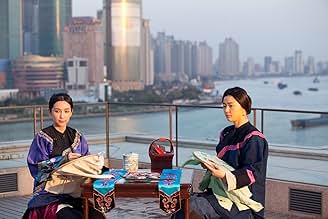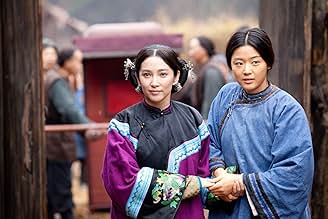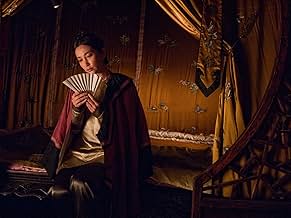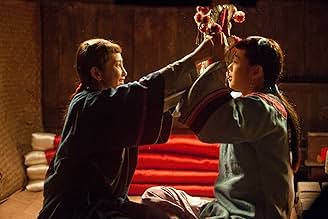CALIFICACIÓN DE IMDb
6.1/10
4.1 k
TU CALIFICACIÓN
Una historia ambientada en China durante el siglo XIX y centrada en la amistad de por vida entre dos chicas que desarrollan su propio código secreto como forma de enfrentarse a las rígidas n... Leer todoUna historia ambientada en China durante el siglo XIX y centrada en la amistad de por vida entre dos chicas que desarrollan su propio código secreto como forma de enfrentarse a las rígidas normas sociales impuestas a las mujeres.Una historia ambientada en China durante el siglo XIX y centrada en la amistad de por vida entre dos chicas que desarrollan su propio código secreto como forma de enfrentarse a las rígidas normas sociales impuestas a las mujeres.
- Premios
- 3 premios ganados y 1 nominación en total
Jun Ji-hyun
- Snow Flower
- (as Gianna Jun)
- …
Hu Qing Yun
- Mrs. Liao
- (as Jingyun Hu)
Shiping Cao
- Mr. Wei
- (as Shi Ping Cao)
Opiniones destacadas
While no match for some of Wayne Wang's other movies, I'd call "Snow Flower and the Secret Fan" worth seeing nonetheless. It tells the story of two friends in present-day Shanghai, and the connection that they have with two girls in 19th century China through a fan on which they wrote secret messages.
Wang famously focused on Chinese-American families in "The Joy Luck Club", and took a bittersweet look at people's lives in "Smoke". This movie doesn't equal either of those, but I still recommend it. The development of Shanghai certainly reflects the changes in the lives of the girls (and the changes that China has undergone over the past 100 years). Not great, but worth seeing.
Wang famously focused on Chinese-American families in "The Joy Luck Club", and took a bittersweet look at people's lives in "Smoke". This movie doesn't equal either of those, but I still recommend it. The development of Shanghai certainly reflects the changes in the lives of the girls (and the changes that China has undergone over the past 100 years). Not great, but worth seeing.
A film about laotong, the bonding of two women for eternity as kindred sisters, is unusual to say the least and one that is beautifully retold in the manner of so many oriental stories must be a rarity. The reason it works so well is because it is shot at two layers, one in the present day, and the other at a time when women needed each other for support. In fact the retelling of the latter is the result of a book written by Sophia of the life of Snow Flower in the title. In each layer Sophia/Snow Flower is bonded to Nina/Lily. The acting by Gianna Jun (Sophia/Snow Flower) and Bingbing Li as Nina/Lily is extraordinary with sterling support from an excellent cast. The cinematography and soundtrack are also first rate.
In essence the story explores love in many guises via the relationship of the two present day characters and their mirrors of old, but it is only at the conclusion of the film that we are allowed to be inside the minds of the kindred sisters and their relationship. This is not a film that pivots upon romantic love since it delves very deep into the agendas the women have and for that reason alone it may not be a commercial success. That shouldn't detract from its beauty as a work of art but clearly it has had an effect on the film's popularity on IMDb. And that is a shame because it is well worth lasting all of its one hundred and four minutes including the beautiful wash drawings displayed with the final credits.
I don't know how this film manages less than six on the ratings for I feel a little mean in only giving it eight because of the material it explores. It is worthy of a visit to cinema, or even ownership of a DVD. Oriental cinema has made another worthy addition to its growing list of excellent stories turned into film.
In essence the story explores love in many guises via the relationship of the two present day characters and their mirrors of old, but it is only at the conclusion of the film that we are allowed to be inside the minds of the kindred sisters and their relationship. This is not a film that pivots upon romantic love since it delves very deep into the agendas the women have and for that reason alone it may not be a commercial success. That shouldn't detract from its beauty as a work of art but clearly it has had an effect on the film's popularity on IMDb. And that is a shame because it is well worth lasting all of its one hundred and four minutes including the beautiful wash drawings displayed with the final credits.
I don't know how this film manages less than six on the ratings for I feel a little mean in only giving it eight because of the material it explores. It is worthy of a visit to cinema, or even ownership of a DVD. Oriental cinema has made another worthy addition to its growing list of excellent stories turned into film.
Sunflower and the Secret Fan is the poignant tale of two 21st century Asian girls and their matches in the 19th century: Both couples are bound by the dictates of a patriarchal culture that challenges the natural love and devotion they feel for each other. These lady laotongs or "old sames" take an oath to make them faithful sisters forever, the outward show of an enduring, lifelong commitment to their sisterhood.
Director Wayne Wang's challenge is to intercut the centuries and women without confusing the audience, a virtue not always achieved in two hours of traversing between times. His limited success can be attributed to the striking skyline of modern Shanghai, an apt metaphor for the change in the ladies' lives, indeed for change itself.
Just as arresting as the visual images is the stringed music of Rachel Portman, which dictates emotions as strongly as any other score I have heard this year. Some might complain of manipulation; I enjoy the excess as if it were an ancient Chinese fan of innumerable design. BTW, the titular fan was used by the 19th century ladies to make messages to each other in their special language. Wang's considerable success showing devoted friends in Joy Luck Club is evidenced in the ladies here.
The bonding of protagonists is strong on the surface, but because there is so much to do in only 2 hours, we never have sustained conversation among them to verify what we intuit without much dialogue. It would be sweet to linger more with them while they show through dialogue the bond that makes them sacrifice for each other throughout their lives.
Snow Flower and the Secret Fan in the end turns on love, its many forms and demands and on change, which frequently derails the best intentions of love itself. The ladies here evidence in delicate ways the tumult and reward accompanying a lifelong commitment to another human being. And that's no secret.
Director Wayne Wang's challenge is to intercut the centuries and women without confusing the audience, a virtue not always achieved in two hours of traversing between times. His limited success can be attributed to the striking skyline of modern Shanghai, an apt metaphor for the change in the ladies' lives, indeed for change itself.
Just as arresting as the visual images is the stringed music of Rachel Portman, which dictates emotions as strongly as any other score I have heard this year. Some might complain of manipulation; I enjoy the excess as if it were an ancient Chinese fan of innumerable design. BTW, the titular fan was used by the 19th century ladies to make messages to each other in their special language. Wang's considerable success showing devoted friends in Joy Luck Club is evidenced in the ladies here.
The bonding of protagonists is strong on the surface, but because there is so much to do in only 2 hours, we never have sustained conversation among them to verify what we intuit without much dialogue. It would be sweet to linger more with them while they show through dialogue the bond that makes them sacrifice for each other throughout their lives.
Snow Flower and the Secret Fan in the end turns on love, its many forms and demands and on change, which frequently derails the best intentions of love itself. The ladies here evidence in delicate ways the tumult and reward accompanying a lifelong commitment to another human being. And that's no secret.
Wayne Wang has directed another winner, "Snow Flower and the Secret Fan". It is a well designed "chick flick" that overcomes ones emotions to the point of great empathy for both the characters and the eras in which it is set. Bingbing Li plays Nina/Lily, and Gianna Jun stars as Snow Flower/Sophia. They are like blood sisters who rotate back and forth from the 19th to the 21st centuries. The story is compelling. The religious and cultural overtones are educational and well depicted. The scenes in Shanghai as well as Australia are vistas that hold one in awe. It is a Drama worth viewing and now is on Blu Ray DVD and worth the effort for the clarity of sound and visual effect. The music is especially well adapted to the film and provides another reason for the extra effect of a good sound system.
SNOW FLOWER AND THE SECRET FAN is the cinematic adaptation of Lisa See's popular novel by writers Angela Workman, Ron Bass and Michael K. Ray and director Wayne Wang. The film unveils parallel stories between 19th century China and present day Shanghai - the tales of two women joined by laotong - a binding vow and contract to be eternal friends and share each others lives - communicating with a secret women's language called nu shu, carefully inked characters placed on the folds between the spines of a silken fan. By using the same actresses to play the parts of the girls two centuries apart adds a mysterious beauty to the films alluring flavor.
In 1826 Lily and Snow Flower become laotung and though they are from opposite ends of the social stratum they become devoted friends, undergoing the ritual of having their feet broken and bound to remain very small as adults - apparently a desired attribute for physical attraction as a potential bride. The poor girl is chosen for marriage by a wealthy family and the rich girl is promised to a butcher, an extreme reversal of roles in society and it is the manner in which each adapts and aids the other that demonstrates the depth of the bond of laotong. Concurrently in the film we meet Nina and Sophie in contemporary Shanghai: Nina has gained education and stature and is due to move to New York as part of an important business. Sophie is in an accident and only slowly do we realize that Sophie had the promise of moving to Australia to marry an Aussie singer (Hugh Jackman), more because she is pregnant than for love. Because of the laotung between Nina and Sophie the two make sacrifices that overcome all else to prove their loyalty. There are many parallels in the two stories that show a bond between the two sets of girls and to capture this bond securely the two girls form centuries apart are played by the same actresses: Lily/Nina become the roles of Bing Bing Li and Snow Flower/Sophie are portrayed by Gianna Jun. The supporting cast is carefully chosen and uniformly fine.
The sets and costumes and music enhance this film significantly. It is not a great epic of a movie, but it has a tender and touching story that is very well told by everyone involved.
Grady Harp
In 1826 Lily and Snow Flower become laotung and though they are from opposite ends of the social stratum they become devoted friends, undergoing the ritual of having their feet broken and bound to remain very small as adults - apparently a desired attribute for physical attraction as a potential bride. The poor girl is chosen for marriage by a wealthy family and the rich girl is promised to a butcher, an extreme reversal of roles in society and it is the manner in which each adapts and aids the other that demonstrates the depth of the bond of laotong. Concurrently in the film we meet Nina and Sophie in contemporary Shanghai: Nina has gained education and stature and is due to move to New York as part of an important business. Sophie is in an accident and only slowly do we realize that Sophie had the promise of moving to Australia to marry an Aussie singer (Hugh Jackman), more because she is pregnant than for love. Because of the laotung between Nina and Sophie the two make sacrifices that overcome all else to prove their loyalty. There are many parallels in the two stories that show a bond between the two sets of girls and to capture this bond securely the two girls form centuries apart are played by the same actresses: Lily/Nina become the roles of Bing Bing Li and Snow Flower/Sophie are portrayed by Gianna Jun. The supporting cast is carefully chosen and uniformly fine.
The sets and costumes and music enhance this film significantly. It is not a great epic of a movie, but it has a tender and touching story that is very well told by everyone involved.
Grady Harp
¿Sabías que…?
- TriviaRupert Murdoch personally asked Fox Searchlight to release this film in North America.
- ErroresThe last paragraphs of the unsent letter that Nina found in Sophias apartment, which can be seen when she closes the notebook, don't match Nina's voice-over.
- ConexionesReferenced in Conan: A Tree with Dutch Elm Disease Grows in Brooklyn (2011)
Selecciones populares
Inicia sesión para calificar y agrega a la lista de videos para obtener recomendaciones personalizadas
- How long is Snow Flower and the Secret Fan?Con tecnología de Alexa
Detalles
Taquilla
- Presupuesto
- USD 6,000,000 (estimado)
- Total en EE. UU. y Canadá
- USD 1,348,205
- Fin de semana de estreno en EE. UU. y Canadá
- USD 134,005
- 17 jul 2011
- Total a nivel mundial
- USD 11,348,205
- Tiempo de ejecución
- 1h 44min(104 min)
- Color
- Mezcla de sonido
- Relación de aspecto
- 2.35 : 1
Contribuir a esta página
Sugiere una edición o agrega el contenido que falta



































